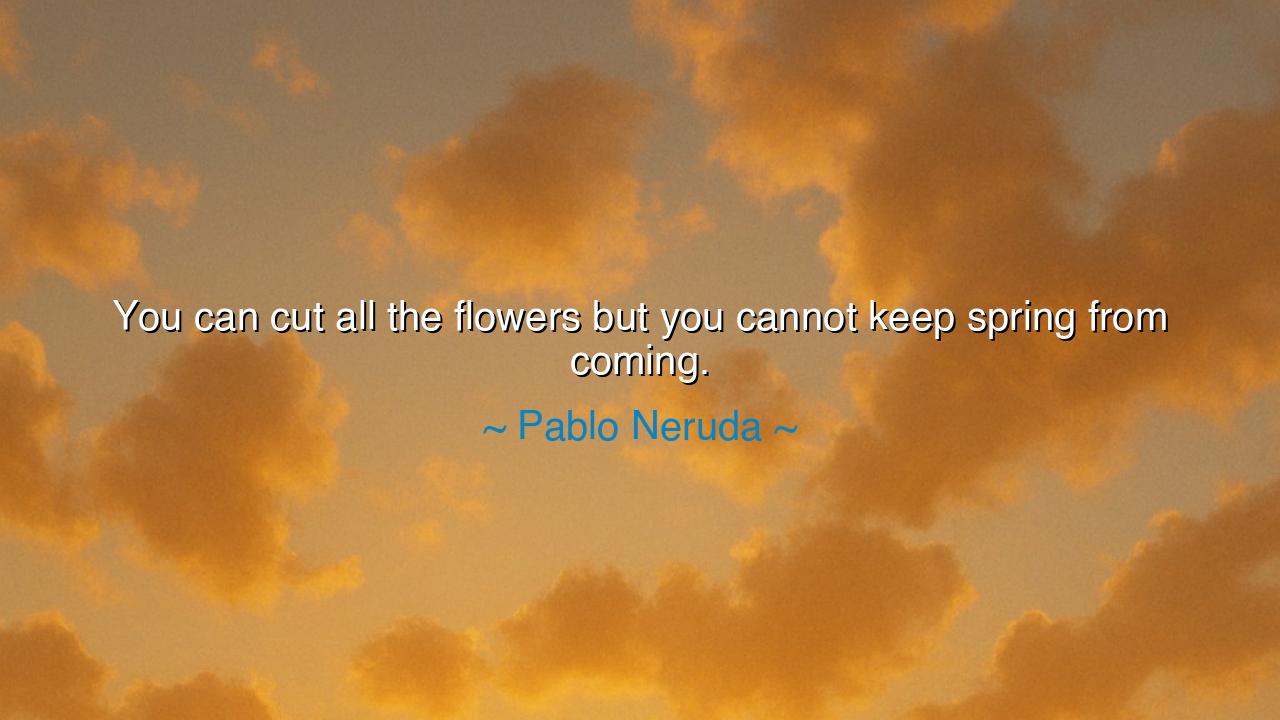
You can cut all the flowers but you cannot keep spring from






The Chilean poet and Nobel laureate Pablo Neruda, whose verses burned with the fire of both love and revolution, once wrote: “You can cut all the flowers but you cannot keep spring from coming.” In this single line, he captures the eternal rhythm of hope, renewal, and resilience—a truth that transcends politics, seasons, and sorrow. Neruda’s words speak not only to the endurance of nature but to the indestructible spirit of life itself. Though cruelty may destroy what blooms before us, though injustice or despair may silence beauty for a time, still, spring will come. For the life-force of the world—and of the human heart—cannot be extinguished by violence or despair.
The origin of this quote lies in Neruda’s life as both poet and witness to oppression. Born in 1904 in Chile, he lived through times of upheaval and exile. He saw the rise of tyranny, the silencing of voices, and the crushing of dreams. Yet even amidst political darkness, he believed in the returning light. For him, spring was not merely a season—it was a symbol of rebirth, of the unstoppable cycle of renewal that governs both nature and human destiny. “You can cut all the flowers” represents every act of destruction—war, censorship, cruelty—but “you cannot keep spring from coming” affirms that no power, however great, can conquer the essence of life or the hope that renews it.
There is a profound metaphor in these words: the flowers are the expressions of beauty, truth, and freedom that bloom in every age; spring is the indomitable spirit of creation that rises again, no matter how often it is cut down. When tyrants suppress poets, when storms destroy the fields, when despair grips the human soul—still, in time, the blossoms return. The petals of hope may fall, but the roots of life remain hidden and alive beneath the soil. Hope, like spring, is not created by man—it is the birthright of the earth itself.
Consider, for instance, the story of Anne Frank, the young girl who kept her diary while hiding from the terrors of war. Even as the world outside her window was consumed by hatred and death, she wrote with unbroken faith: “In spite of everything, I still believe that people are really good at heart.” Her words are a living echo of Neruda’s truth. Though her life was tragically cut short—like the flowers in his verse—her spirit became a seed planted in the conscience of humanity. Through her, spring came again, teaching future generations that light cannot be banished forever by darkness.
In a broader sense, Neruda’s quote speaks to the eternal cycles of life and transformation. Empires rise and fall, but humanity endures. Winters of sorrow pass, and new generations bloom with courage and song. Every revolution, every movement toward justice, is another spring born from the ashes of winter. History itself is a garden that cannot be fully destroyed, for its soil is made of memory, its roots watered by time. Thus, Neruda’s words are not only a comfort—they are a declaration of defiance. They remind us that those who destroy beauty cannot destroy its return.
Yet this truth extends beyond politics or history—it lives within each soul. There are times when we, too, experience winters of grief or despair, when all the flowers of joy seem cut down. But life, in its wisdom, holds seasons for every heart. Pain passes. Renewal comes. The human spirit, like the earth, heals in its own time. The same unseen power that brings back the blossoms after frost works silently within us, preparing us to bloom again. This is why Neruda’s words feel both tender and invincible—they promise that no matter how deep the cold, spring is always on its way.
The lesson, then, is one of faith and perseverance. Do not despair when your flowers are cut—when dreams fail, or joy fades, or the world seems barren. Trust in the cycle of renewal that governs all things. Keep tending the garden of your soul even when it lies empty, for life has a sacred rhythm that no darkness can break. Continue to love, to hope, to believe, and one morning, you will wake to find that the frost has melted, the sun has returned, and your heart is once more in bloom.
For in the end, Neruda teaches us this eternal truth: you cannot keep spring from coming. You may cut the flowers, silence the poets, or bury hope beneath the soil of suffering—but you cannot imprison the dawn. The light will rise. The heart will heal. And life, in its quiet glory, will find its way back into the world, no matter how long the winter has been.






AAdministratorAdministrator
Welcome, honored guests. Please leave a comment, we will respond soon